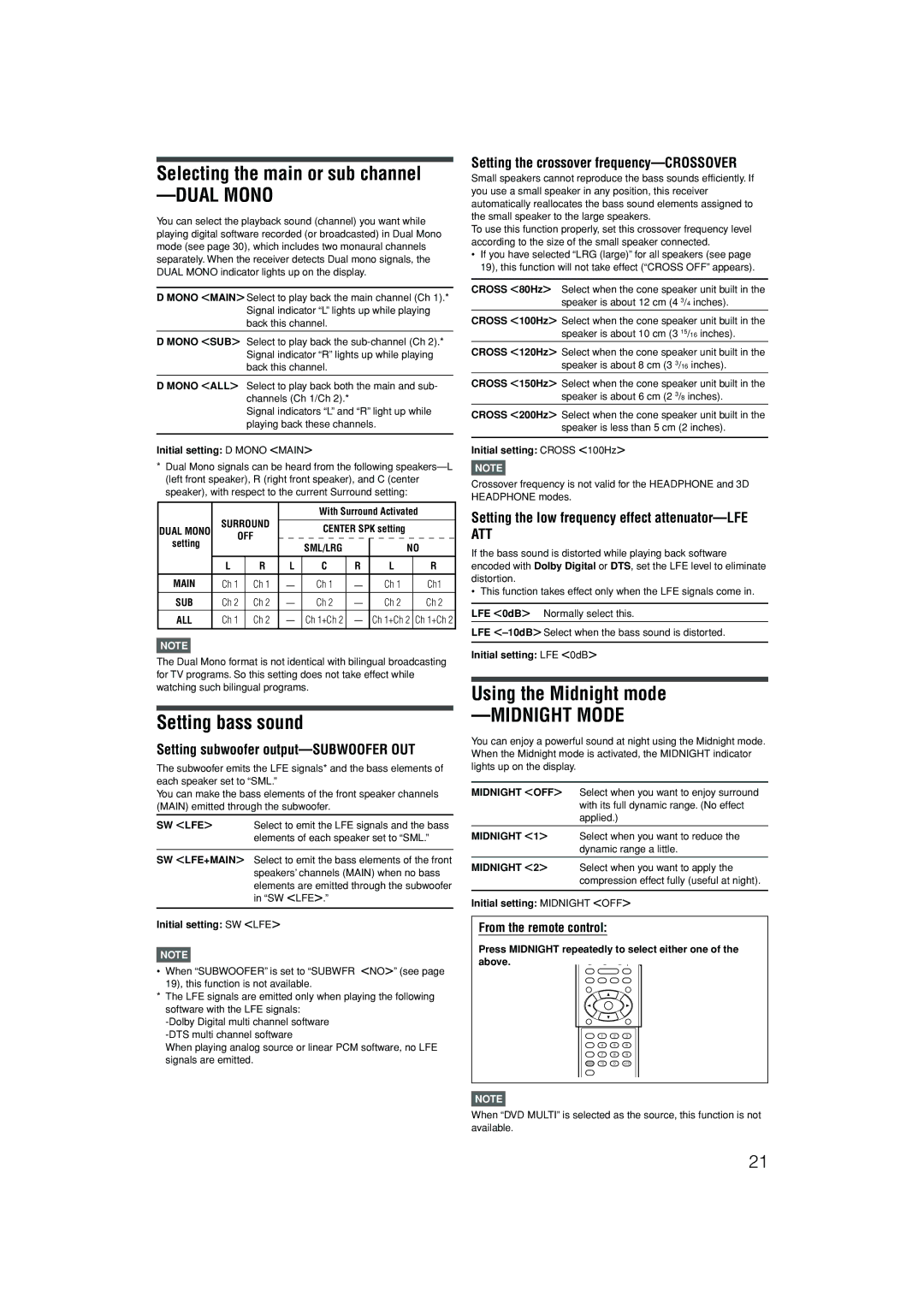
Selecting the main or sub channel
—DUAL MONO
You can select the playback sound (channel) you want while playing digital software recorded (or broadcasted) in Dual Mono mode (see page 30), which includes two monaural channels separately. When the receiver detects Dual mono signals, the DUAL MONO indicator lights up on the display.
D MONO <MAIN> Select to play back the main channel (Ch 1).* Signal indicator “L” lights up while playing back this channel.
D MONO <SUB> Select to play back the
D MONO <ALL> Select to play back both the main and sub-
channels (Ch 1/Ch 2).*
Signal indicators “L” and “R” light up while playing back these channels.
Initial setting: D MONO <MAIN>
*Dual Mono signals can be heard from the following
| SURROUND |
|
|
| With Surround Activated |
| ||||||
|
|
|
|
|
|
|
|
|
|
| ||
DUAL MONO |
|
|
| CENTER SPK setting |
| |||||||
OFF |
|
|
|
| ||||||||
setting |
|
|
| SML/LRG |
|
|
| NO |
| |||
|
|
|
|
|
|
|
|
| ||||
|
|
|
|
|
|
|
|
|
| |||
|
|
|
|
|
|
|
|
|
|
|
|
|
| L | R |
| L | C |
| R | L |
| R | ||
MAIN | Ch 1 | Ch 1 |
|
|
| Ch 1 |
|
|
| Ch 1 |
| Ch1 |
|
|
|
|
|
|
| ||||||
|
|
|
|
|
|
|
|
|
|
|
|
|
SUB | Ch 2 | Ch 2 |
|
|
| Ch 2 |
|
|
| Ch 2 |
| Ch 2 |
|
|
|
|
|
|
| ||||||
ALL | Ch 1 | Ch 2 |
|
|
| Ch 1+Ch 2 |
|
|
| Ch 1+Ch 2 | Ch 1+Ch 2 | |
|
|
|
|
|
| |||||||
|
|
|
|
|
|
|
|
|
|
|
|
|
NOTE
The Dual Mono format is not identical with bilingual broadcasting for TV programs. So this setting does not take effect while watching such bilingual programs.
Setting bass sound
Setting subwoofer output—SUBWOOFER OUT
The subwoofer emits the LFE signals* and the bass elements of each speaker set to “SML.”
You can make the bass elements of the front speaker channels (MAIN) emitted through the subwoofer.
SW <LFE> | Select to emit the LFE signals and the bass |
| elements of each speaker set to “SML.” |
SW <LFE+MAIN> Select to emit the bass elements of the front speakers’ channels (MAIN) when no bass elements are emitted through the subwoofer in “SW <LFE>.”
Initial setting: SW <LFE>
NOTE
•When “SUBWOOFER” is set to “SUBWFR <NO>” (see page 19), this function is not available.
*The LFE signals are emitted only when playing the following software with the LFE signals:
When playing analog source or linear PCM software, no LFE signals are emitted.
Setting the crossover frequency—CROSSOVER
Small speakers cannot reproduce the bass sounds efficiently. If you use a small speaker in any position, this receiver automatically reallocates the bass sound elements assigned to the small speaker to the large speakers.
To use this function properly, set this crossover frequency level according to the size of the small speaker connected.
•If you have selected “LRG (large)” for all speakers (see page 19), this function will not take effect (“CROSS OFF” appears).
CROSS <80Hz> Select when the cone speaker unit built in the speaker is about 12 cm (4 3/4 inches).
CROSS <100Hz> Select when the cone speaker unit built in the speaker is about 10 cm (3 15/16 inches).
CROSS <120Hz> Select when the cone speaker unit built in the speaker is about 8 cm (3 3/16 inches).
CROSS <150Hz> Select when the cone speaker unit built in the speaker is about 6 cm (2 3/8 inches).
CROSS <200Hz> Select when the cone speaker unit built in the speaker is less than 5 cm (2 inches).
Initial setting: CROSS <100Hz>
NOTE
Crossover frequency is not valid for the HEADPHONE and 3D HEADPHONE modes.
Setting the low frequency effect attenuator—LFE ATT
If the bass sound is distorted while playing back software encoded with Dolby Digital or DTS, set the LFE level to eliminate distortion.
•This function takes effect only when the LFE signals come in.
LFE <0dB> Normally select this.
LFE
Initial setting: LFE <0dB>
Using the Midnight mode
—MIDNIGHT MODE
You can enjoy a powerful sound at night using the Midnight mode. When the Midnight mode is activated, the MIDNIGHT indicator lights up on the display.
MIDNIGHT <OFF> Select when you want to enjoy surround with its full dynamic range. (No effect applied.)
MIDNIGHT <1> Select when you want to reduce the dynamic range a little.
MIDNIGHT <2> Select when you want to apply the compression effect fully (useful at night).
Initial setting: MIDNIGHT <OFF>
From the remote control:
Press MIDNIGHT repeatedly to select either one of the above.
1 2 3
4 5 6
7 8 9
10 | 0 | 10 |
NOTE
When “DVD MULTI” is selected as the source, this function is not available.
21
